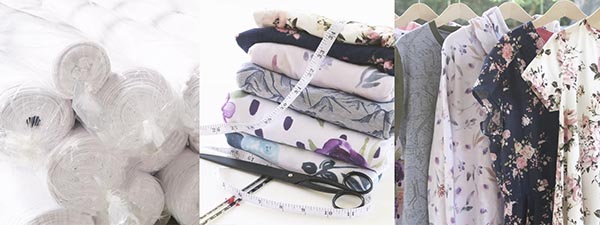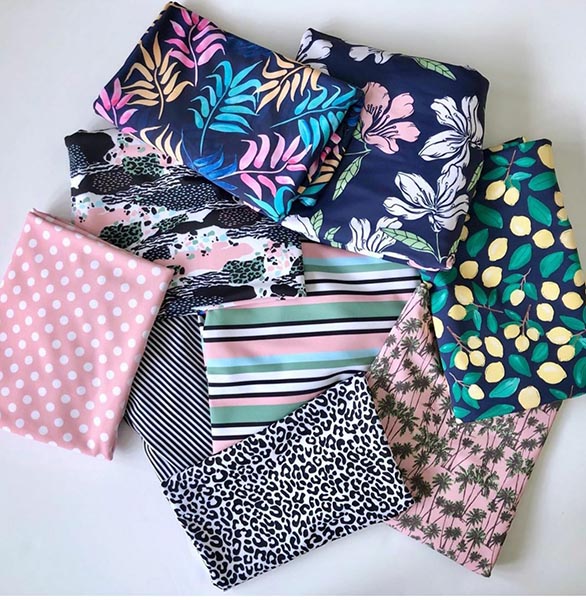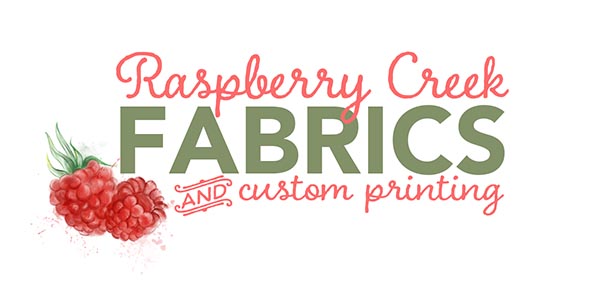Factory Automation for Printing Fabric On Demand Translates to Big Business
Diana Rammell wanted better fitting clothes but was disappointed in the selection of fabrics she could find. So she took matters into her own hands, founding Raspberry Creek Fabrics in 2010 to create more compelling fabric designs. When her dreams got a l

What began as a project to produce fabric designs more in line with her tastes has turned into a growing and profitable business for Diana Rammel and her attorney husband Justin. Ten years in, Utah-based Raspberry Creek Fabrics is producing about 40,000 yards of custom fabrics printed on demand, with an average order size of three to six yards.

Digital textile printing: from plain white fabric to finished customized apparel with minimal waste and a small environmental footprint.
“Eighty percent of our business is selling yardage to our retail customers,” Justin said. “If you are a standard fabric store, you probably are ordering 5,000 yards of each fabric design you carry, and that’s a lot of inventory risk. With our model, customers can choose from any of our designs—or their own—and order exactly what they need, with delivery in as little as three to five days. Not only does this eliminate inventory risk, it’s much more sustainable, since unused inventory must be discarded, adding to the landfill burden. Most retail lives by the rule of thirds—one-third of inventory is sold through retail, one-third goes to the discount table, and one-third goes to the trash. Our goal was to break that cycle.”
 When the Rammells decided to bring fabric printing in house, Justin knew that automation would be key.
When the Rammells decided to bring fabric printing in house, Justin knew that automation would be key.
“Not only did we want to be able to produce smaller quantities of printed fabric profitably, but we also wanted to be agile enough to respond quickly to trends and customer feedback.”
He cited an example of a line of mermaid swimwear for little girls where the mermaids were all white.
“About two years ago, we started getting feedback from customers that they wanted a more diverse design library, a requirement that has become even more essential in today’s climate," he said. "We were able to develop new, more diverse images and quickly get them to market, without the need to discard some large inventory of existing fabric.”
The Raspberry Creek Fabrics production platform, operated by nine full-time employees and in collaboration with a network of graphic designers, consists of an EFI Reggiani NEXT 180 dye-sublimation printer, a Kornit Allegro for printing on cotton, a large Klieverik heat press and a Zünd SL 1600 cutter. But the equipment configuration was only part of the solution. Justin knew they needed to ensure as much end-to-end automation as possible in order for the model to work.

“We created API integration with our EFI Reggiani printer that helps us completely automate the order-to-production process," he said. "Using the EFI Reggiani API, we have been able to develop software that connects into any retailer’s portal so we can quickly and automatically grab order details and design files, place orders in our system, automatically color correct, print and transfer the fabric to our Zünd XL-1600 for cutting. We also print a QR code on the fabric that contains all of the order and shipping information, helping us quickly and profitably manage even the smallest orders, getting them out the door with as little human intervention as possible. This AI approach also integrates us with shippers such as FedEx and UPS. When product arrives in shipping, operators scan the code and the appropriate information is brought up on a touch screen, automatically producing the shipping label. This is one of the key things that has allowed us to both grow our business and be flexible and nimble enough to respond to changing market trends and conditions.”
Justin said that much of the fabric printing is done overnight.
“Our Zünd cutter is very fast, so when we come in in the morning, we can get right to the cutting, packing and shipping, quickly getting the night’s production out the door.”
In addition to the fast update of the mermaid fabric, Justin cited the company’s ability to rapidly respond to the need for face masks in the current pandemic crisis.
“Because we have a high capacity printer,” he said, “we were recently able to manufacture 17,000 masks for a retail customer within days, at a great profit margin, in response to the COVID-19 pandemic. We can produce 10,000 or more in one shift, making us able to quickly respond to these types of demands. That’s the beauty of digital fabric printing with high-capacity printers like those from EFI and Kornit.”
For longer runs and for items that need to be sewn, Raspberry Creek has a network of suppliers that can handle those needs, including cut-and-sew shops in Utah.
“For sewn products,” Justin said, “we can handle the entire process all local to Salt Lake, keeping lead times and costs down.”
In determining how to configure the factory, Justin explained the decision to go with high-capacity printers.
“For someone starting out like we did, you need to decide if you are going to operate a fleet of small printers or a couple of large printers that can handle workflow. A fleet of small printers is labor-intensive, and the only way we will beat overseas costs is by investing in technology. Higher-capacity machines lower production costs and make the whole process more efficient.”
Justin also believes this approach gives them less overall downtime.
“We’ve been running our EFI Reggiani since May of 2018,” he said, “and we haven’t had anything happen that has taken us down more than a day.”
He also sends kudos to both EFI Reggiani and Kornit for their excellent support.
“They [EFI Reggiani] care more about the whole client experience than just making the sale and moving on. They have introduced us to other people, given us lots of ideas about what the printers can do, and parts and consumables are always readily available.”
The Kornit Allegro was installed in April 2017 and the support from Kornit has been excellent as well.
“The Allegro allows us to print directly to natural fiber fabrics such as cotton, bamboo, hemp, rayon, etc.,” Justin said. “With heat transfer dye sublimation, the process we are using with the Reggiani printer, you need polyester or polyester blend fabric. Combined, they increase the range of products we can offer.”




